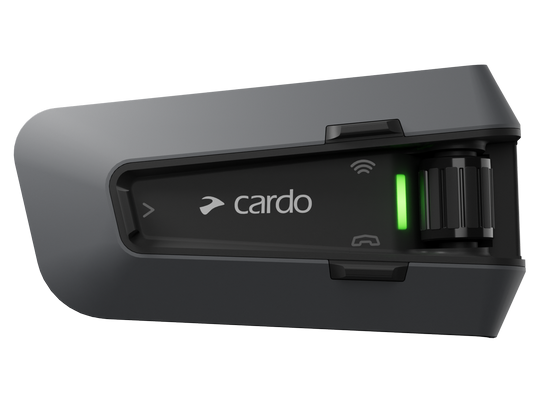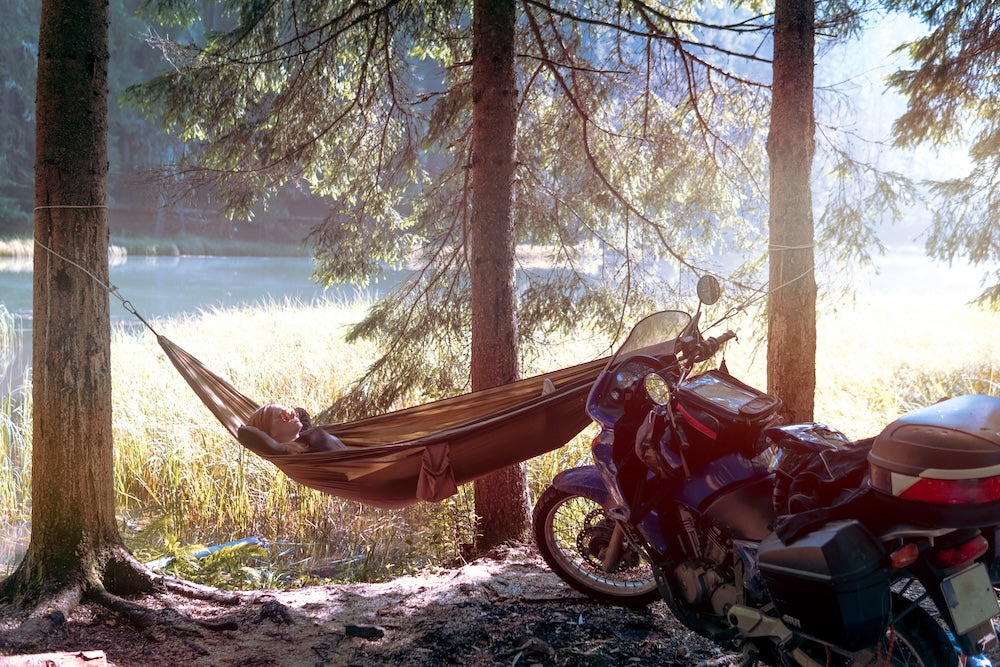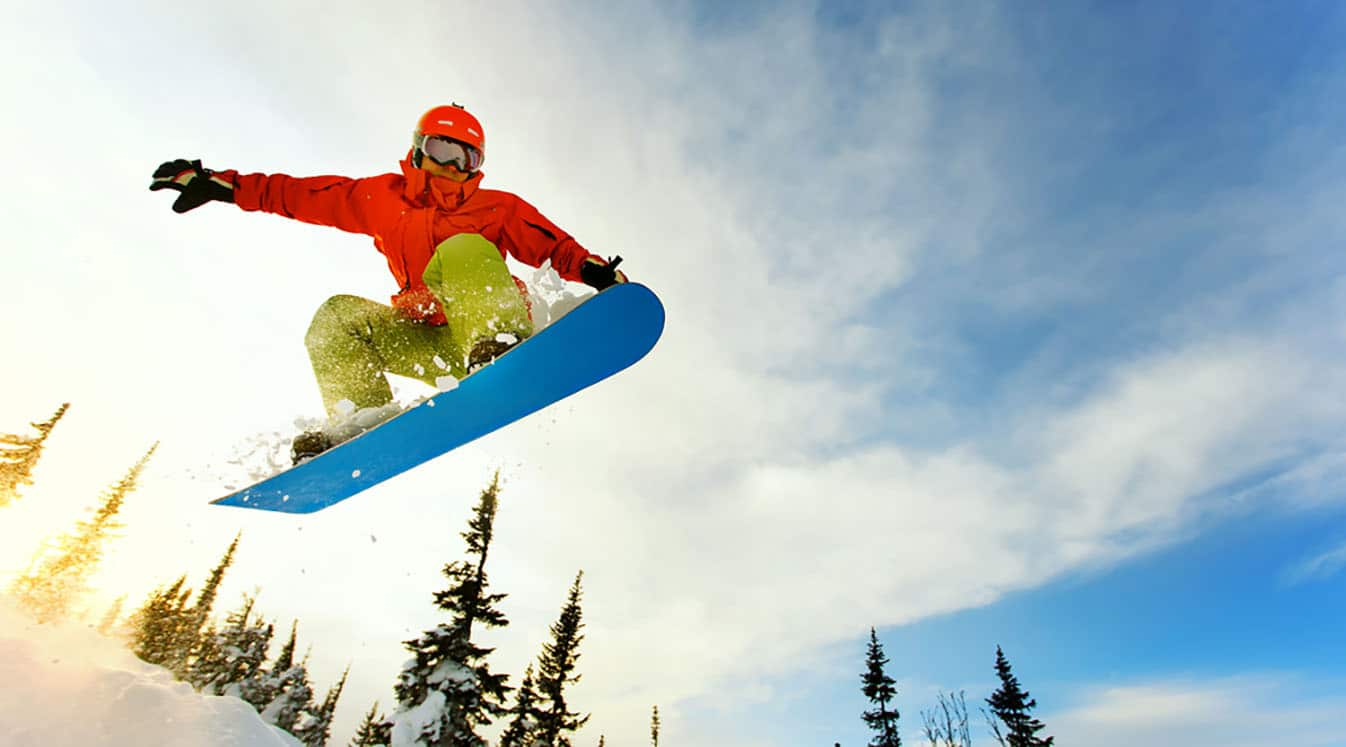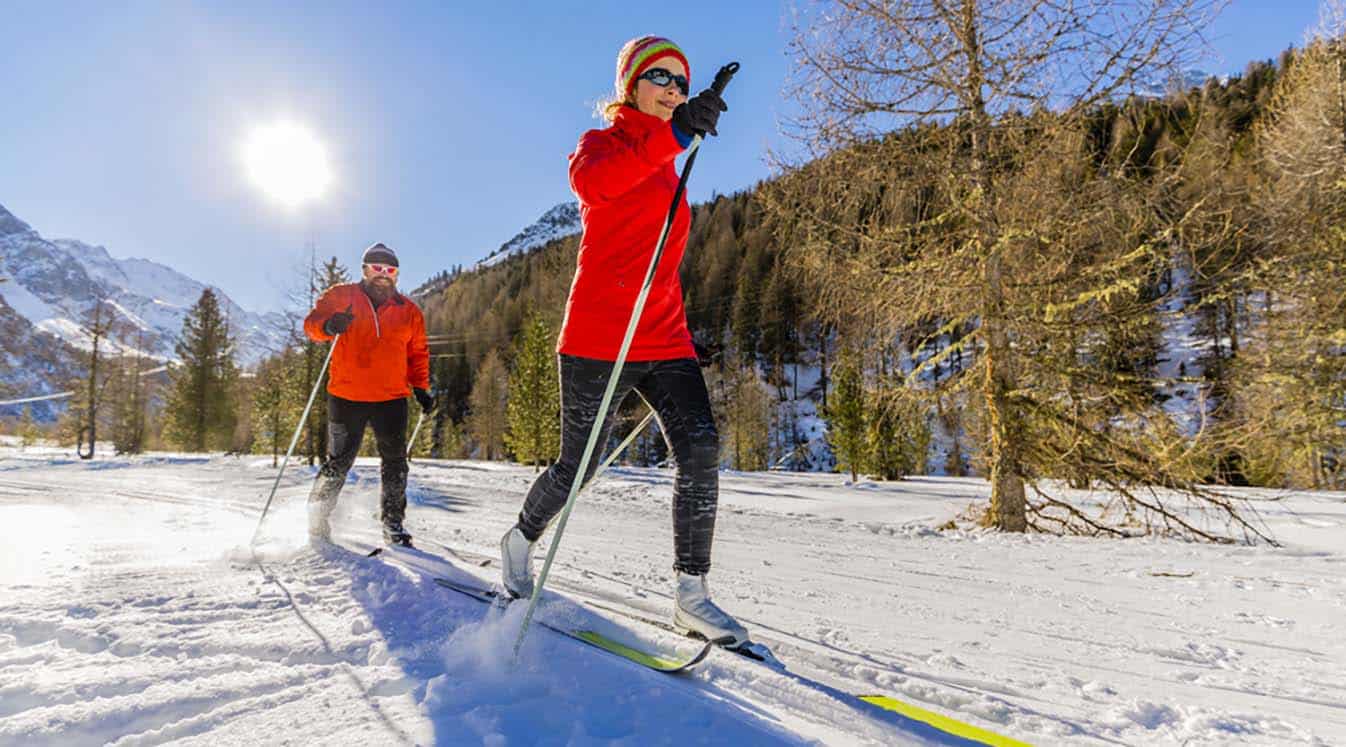On the surface, motorcycle camping invites you to pare it back to basics. Out in the beauty of nature, it should be just you, your bike and your tent—right?
Well, not quite. Motorcycle camping may be about enjoying the simple things in life, but there are lots of essentials that you should be sure to take along. Good preparation pays off by giving you the important tools that you need to have a great time on a motorcycle camping trip. A well-packed kit can salvage your trip (or save your life) if disaster strikes.
When you’re planning a motorcycle camping trip, use the following list as a guide for packing your bike. Although it’s not a comprehensive list of everything you could possibly need, you’ll find the basics here, along with a few compact nice-to-haves that will make your life easier and your trip more enjoyable.
Riding Essentials
These key items will help keep your bike in good working order throughout your trip and make sure that your gear arrives intact.
Riding Outfit
While a helmet is the bare minimum, a well-equipped rider will also have the following:
- Riding gloves
- Riding pants
- Riding jacket
- Riding boots
Since motorcycle camping often involves a fairly long ride into the wilderness, try to bring comfortable gear that you won’t need to break in on the trip.
Maintenance and Repair Kit
The last thing you want is to be stuck in the middle of nowhere with no means of fixing a simple problem such as a flat. Thus, it’s important to have the tools on hand that will allow you to complete essential fixes on the road, or at least put together a solution that can get you to a shop. You should have simple items such as a motorcycle flat kit and multi-tool on hand, plus a spare bulb and a few spare fuses.
Saddlebags
Where do you think you’re going to put all that gear without saddlebags? Lockable hard cases made from durable plastics are the most rugged type of saddlebags, but soft saddlebags are also available if you want something lighter. A motorcycle backpack is a good idea if you plan on doing some hiking in addition to your camping expedition. Remember to take your bike out for a ride with your new saddlebags if you’re not used to riding with them, as they can substantially alter the way your bike handles.
Motorcycle Lock
Sure, your bike probably won’t get stolen while camping, but do you really want to take a chance on probably? The safe bet is to bring a simple motorcycle lock in your kit. A simple disc lock usually does the trick and is relatively easy to fit into your luggage.
Bluetooth Helmet Communicator
Whether you’re riding with a group of camping buddies or keeping in touch with your home base, a motorcycle helmet communicator will help keep you connected when you need it the most. Systems like the Cardo PACKTALK PRO and Cardo PACKTALK EDGE use dynamic mesh communication to create the ideal solution for large riding groups, while the Cardo FREECOM 2x is perfect for a solo ride.
Dry Bags
Wet gear is a big problem, and it can be genuinely dangerous if, for example, you have no access to dry clothes. That’s why dry bags are important. Stash your gear inside these light and rugged bags, and no rain will be able to attack your gear (so long as you seal the bag correctly).
Camping Gear
If you already own full-size camping gear, you may need to downsize and pick up some more saddlebag-friendly versions of the essentials below. Look for camping items designed for backpacking, as these are more likely to fit.
Tent
Choosing the right tent is important for motorcycle camping. First, you want something that’s rated for the season and climate you’ll be camping in, and it should be a relatively compact model that collapses fully and stores easily in a saddlebag. A two-person tent is usually the biggest you’ll want to carry.
Sleeping Bag
A good comfy sleeping bag is crucial to an enjoyable camping trip. Look at your bag’s temperature rating and pick one that’s rated for your season and climate. Don’t forget to pick up a sleeping bag pad, as they’re a lifesaver for making your sleep more restful.
Fire Starting Kit
Many campers will want to make a fire, so make sure you bring a fire starting kit. Many all-in-one kits are now available for a reliable fire that can be struck even in wet and windy conditions.
Pillow
Your trip will be much more comfortable and enjoyable if you can lay your head on a decent pillow at night. Many great camping pillows are available that will give you the comfort of a larger pillow in a much less bulky package.
Water Bottle
Staying hydrated is incredibly important when you’re out on a ride, and it’s doubly so when you’re camping out. You want a durable and lightweight model made from tough plastic or stainless steel.
Water Filtration System
If you’re camping at an established campsite with a fresh water spigot, you can probably skip this, but backcountry campers will need to pack their own filtration system. Iodine tablets are a compact classic, but they don’t taste the best, so remember that compact filtration system options such as the LifeStraw are also available.
Knife/Multi-Tool
A multi-tool with a good knife is one of the most versatile and useful things that any outdoor enthusiast can pack. Which model you choose is a matter of preference, but it should have a few basic tools, including a knife, a bottle opener, pliers, tweezers, scissors and screwdriver bits.
Flashlight
Your phone will do for a light source in a pinch, but it’s always better to have a real flashlight on your trip. The days of big, bulky camping flashlights are long since over—grab a compact, tactical-style flashlight for a light source that will fit easily into your saddlebag.
Bug Spray and Sunscreen
Bug bites and sunburn are two of the easiest ways to ruin the fun of camping, so take the steps to protect against them both. Bug repellent is largely a matter of preference—some people like natural solutions such as citronella oil, while others prefer to use heavy-duty options like DEET.
The American Academy of Dermatologists recommends using sunscreen with an SPF of at least 30 to protect from the harmful rays that cause skin cancer. It’s preferable to stay out of the sun between 10 AM and 2 PM when UV rays are strongest, and since you’ll most likely be riding during those hours, you either want a good, strong sunscreen or minimally exposed skin.
Personal Care
It’s important to take care of your body and your health on a motorcycle camping trip, and these items will help ensure that you can get the care you need.
First Aid Kit
This one can be a literal lifesaver, so don’t even think of heading off into the woods without it. Outdoor supply stores sell pre-made camping first aid kits with all the essentials. A basic kit should include the following at minimum:
- Hydrogen peroxide
- Self-adhesive bandages
- Gauze bandages
- Bandage tape
- Thermometer
- Cotton balls
- Cold compress pack
- Emergency blanket
- Heat packs
Toiletries
You’ll need to pack travel-sized versions of your basic personal care items, such as:
- Toothbrush
- Toothpaste
- Deodorant
- Mouthwash
- Toilet paper
Depending on the length of your trip, you may also need items like nail clippers. Consider how long you’ll be camping and pack accordingly.
Contacts/Glasses
If you wear corrective lenses, make sure you’ve got all of the supplies you need that go with your glasses or contacts. If you wear glasses, bring an extra pair just in case. For contact lens wearers, make sure to bring extra solution and lenses, and wash your hands thoroughly before applying or removing your contacts.
Comfortable Clothes
You’re not going to want to camp out in your jacket and riding suit, so make sure to bring along some comfortable and seasonally appropriate clothing. Use your best judgment as to what kind of clothing you’ll need while camping, and remember that elevation changes can make nights much colder than you might initially realize.
Camp Towel
A camp towel is the ultimate “better to have and not need” item. These ultra-absorbent towels pack much smaller than a normal towel and absorb an incredible amount of water. Grab one and thank yourself later.
Cooking Supplies
Much of the gear in this section will depend on how long you’re planning to camp. If you’re taking a simple weekend trip, you may be able to get by with less, while if you’re headed into the backcountry, you’ll probably need just about everything here.
Food
For shorter trips, many campers rely on instant food options. If you’re headed out on a longer expedition (or you want to eat better), find a few camping recipes you like and purchase the right ingredients. Consider what will keep without refrigeration and what won’t and plan accordingly.
Camping Stove/Fuel
A camping stove is your basic cooking device on a long camping trip. Which fuel you need to bring will be determined by what kind of stove you’re using. Some camping stoves use isobutane canisters, others burn solid fuel, and still others burn wood. Remember that fire safety restrictions in your camping area may affect the type of fuel you can use.
Camping Dishes/Silverware
A basic set of camping plates, cups, and silverware is another must-have. Military outdoor mess kits are often a good choice for motorcycle camping, as they’re created to pack down small. Check military surplus sites to find an option you like.
Can Opener
On longer camping trips, you’ll likely need to crack into some canned food, so make sure to pack a can opener. The so-called “GI can opener” is an incredibly cheap and reliable device that has no moving parts to break—learn to use one, and you’ll never be without.
Other Necessities
The items in this section don’t fit neatly into another category, but they can make your life a lot easier on a motorcycle camping trip.
ID
You should essentially always have your ID on you, and in the case of motorcycle camping, you may need to show it to a law enforcement official. For those going on an international motorcycle camping trip (lucky you!), make sure to bring a passport and a photocopy backup.
Cash and Cards
Carry along some cash and your credit card in a secure pouch for essential purchases on your trip. You’ll need at least enough to cover gas, food and any fees your campsite may charge, but leave yourself a little padding in your budget in case something unexpected happens.
Road Map
A little old-school? Yes, but when you no longer recognize town names and your phone is at 10 percent battery, you’ll be glad to have it as a backup. You can either choose a compact road atlas or just bring a map of the area.
Duct Tape
Duct tape comes in handy for fixing approximately twenty million different things, so it’s a great idea to keep a roll of it in your saddlebag.
Hammock
Who doesn’t love a hammock when camping? While it’s not strictly essential, a hammock can go a long way toward creating a miniature paradise at your campsite. Camping hammocks are great because they’re designed to pack small.
Helmet Speakers
Want to enjoy your favorite music while you’re on the road? Grab some helmet speakers and rock out to whatever you want. Remember that if you want to control the music playing on your phone, you’ll need a hands-free Bluetooth helmet system like the Cardo FREECOM 4x.
Book
If you’ll be camping out for a while, it can be a great time to do a little bit of reading. Whatever your preferred genre of literature, throw a book in your saddlebag and enjoy the pleasure of reading in nature.
That sounds like a lot of stuff, right? Actually, if you buy compact, camping-friendly versions of the gear we’ve talked about here, it can fit surprisingly well into a set of quality saddlebags. Practice packing your items a few times and note what’s hard to fit. Then, refine your strategies and learn where everything is so you can make and break camp quickly.





